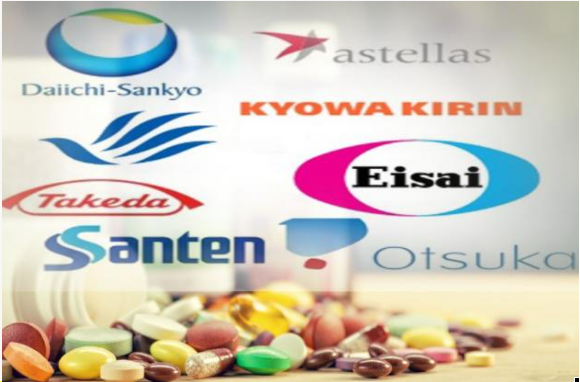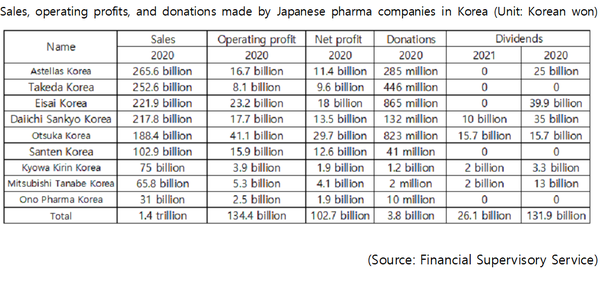The financial reports of Japanese pharmaceutical companies operating in Korea showed they remitted large amounts of dividends to their headquarters, while offering little in social contributions.

According to audit reports submitted by the Korean branches of nine Japan-based multinational pharmaceutical companies to the Financial Supervisory Service (FSS), some even paid dividends four times larger than their net profits even amid the Covid-19 pandemic.
The nine companies are Astellas Korea, Takeda Korea, Eisai Korea, Daiichi Sankyo Korea, Santen Korea, Mitsubishi Tanabe Korea, Ono Pharma Korea, Otsuka Korea, and Kyowa Kirin Korea.
Among them, six companies -- Astellas Korea, Eisai Korea, Daiichi Sankyo Korea, Mitsubishi Tanabe Korea, Otsuka Korea, and Kyowa Kirin Korea -- paid a combined total of 132.1 billion won ($114.5 million) in dividends last year.
Besides, Daiichi Sankyo Korea, Mitsubishi Tanabe Korea, Otsuka Korea, and Kyowa Kirin Korea decided to pay additional dividends this year, close to 30 billion won.
Eisai Korea remitted the largest dividend to its headquarters last year, sending 40 billion won in an interim dividend.
The company was followed by Daiichi Sankyo Korea (35 billion won), Astellas Korea (25 billion won), Otsuka Korea (15.7 billion won), and Mitsubishi Tanabe Korea (13.1 billion won).
Among them, Otsuka Pharmaceutical and Daiichi Sankyo decided to remit additional dividends of 15.7 billion won and 10 billion won, respectively, to the headquarters this year. The amount paid by Daiichi Sankyo over the past two years alone amounted to 45 billion won.
Otsuka Pharmaceutical has also sent out 15.7 billion won in dividends for three consecutive years, sending a total of 47.1 billion won to its parent company.
The same goes for Mitsubishi Tanabe Pharma Korea. After paying 1.9 billion won to the headquarters last year, the company remitted an additional 11.2 billion won through interim dividends. As the company has decided to pay out 2.1 billion won this year, the possibility of another interim dividend is also open.
In contrast, the Japanese drugmakers’ social contributions remain at unreasonably stingy levels compared to the huge dividends they send to their headquarters.
For example, Daiichi Sankyo remitted dividends totaling 35 billion won, about four times its net profit of 9 billion won, last year, recording a dividend payout ratio of nearly 400 percent.
During this period, Daiichi Sankyo recorded 190.5 billion won in sales in Korea with a growth rate of 20 percent.
In contrast to the strong growth, the company only donated 425 million won to society.
The company decided to pay another 10 billion won in dividends out of its net profit of 13.5 billion won this year, and the dividend payout ratio reached 74 percent, but the donation amount shrank during the same period to 132 million won.
Daiichi Sankyo is not alone. Dividend payout ratios for other Japanese pharmaceutical companies here were Mitsubishi Tanabe Korea’s 341 percent, Eisai’s 166 percent, Astellas’ 153 percent, Kyowa Kirin’s 101 percent, and Otsuka’s 53 percent, s they remitted dividends far exceeding its net profit to the headquarters.
Despite their hefty dividends, the audit report revealed that the companies were tight-fisted in donating part of their earnings to their host society.
Nine Japanese pharmaceutical companies donated only 3.8 billion won in donations last year.
Kyowa Kirin spent the largest amount of money among Japanese pharmaceutical companies for social contribution with 1.2 billion won, followed by Eisai with 865 million won, Otsuka 823 million won, Astellas 285 million won, and Takeda 446 million won, Santen 41 million won, Ono Pharma 10 million won, and Mitsubishi Tanabe 2 million won.
Considering that these companies sold a hefty 1.42 trillion won in sales and recorded an operating profit of 134.8 billion won last year from local patients' pockets, their donations seem to be substantially low.


